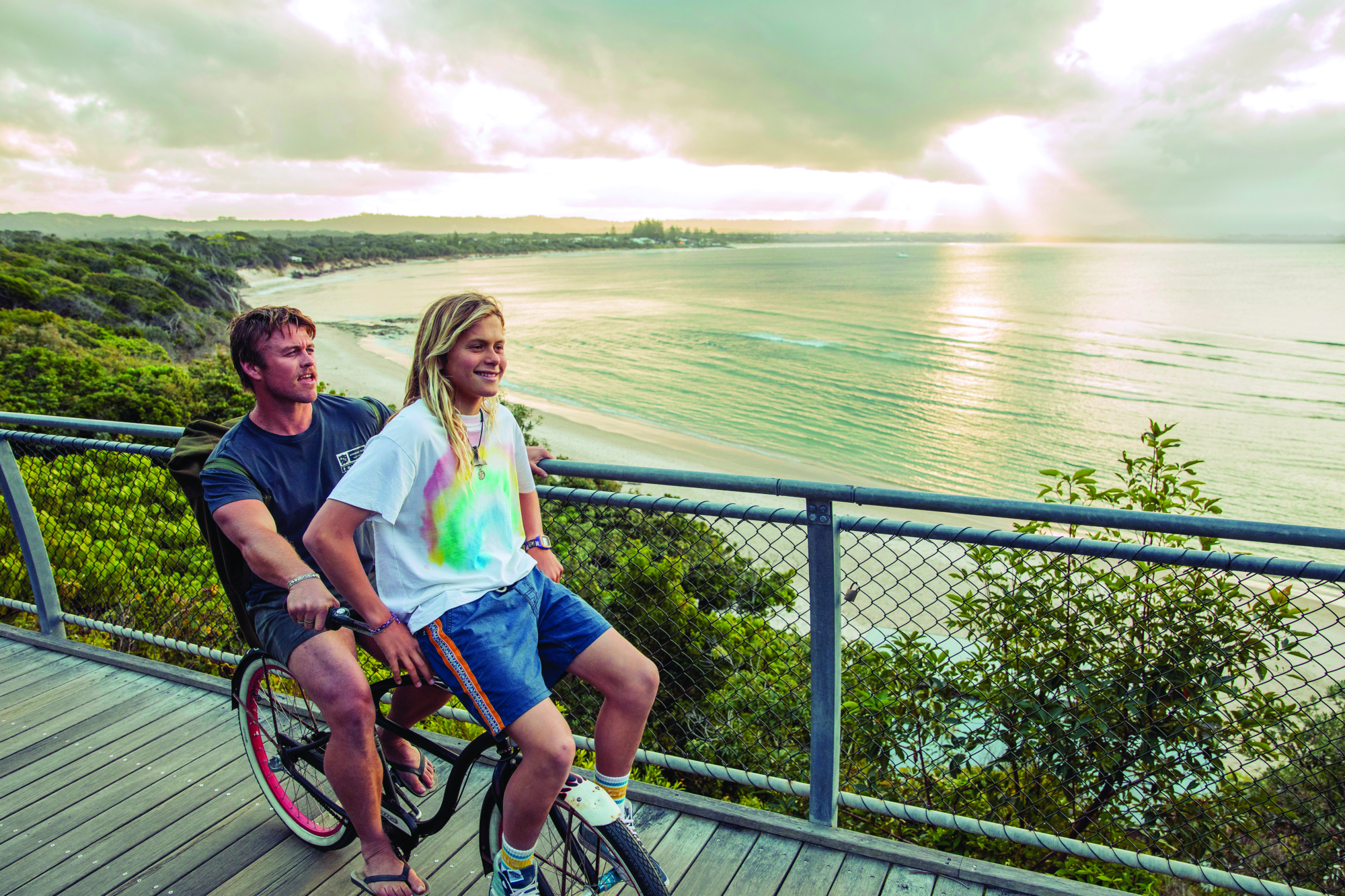Wayward father Bosch (Luke Hemsworth) attempts to escape his crime-ridden past while reconnecting with his surf-loving teenage son, Rockit (Rasmus King), in Tyler Atkins’ feature directorial debut. Told from the teenager’s perspective, Bosch & Rockit (2022) is a raw coming-of-age drama characterised by commanding performances, immersive scenes of the Byron Bay surf and a deeply emotive soundtrack.
I talk to writer/director Atkins about how he accomplished authenticity by drawing from personal experiences, employing naturalistic dialogue and taking a chance on using a newcomer in the lead in a film that explores a powerful father–son bond.
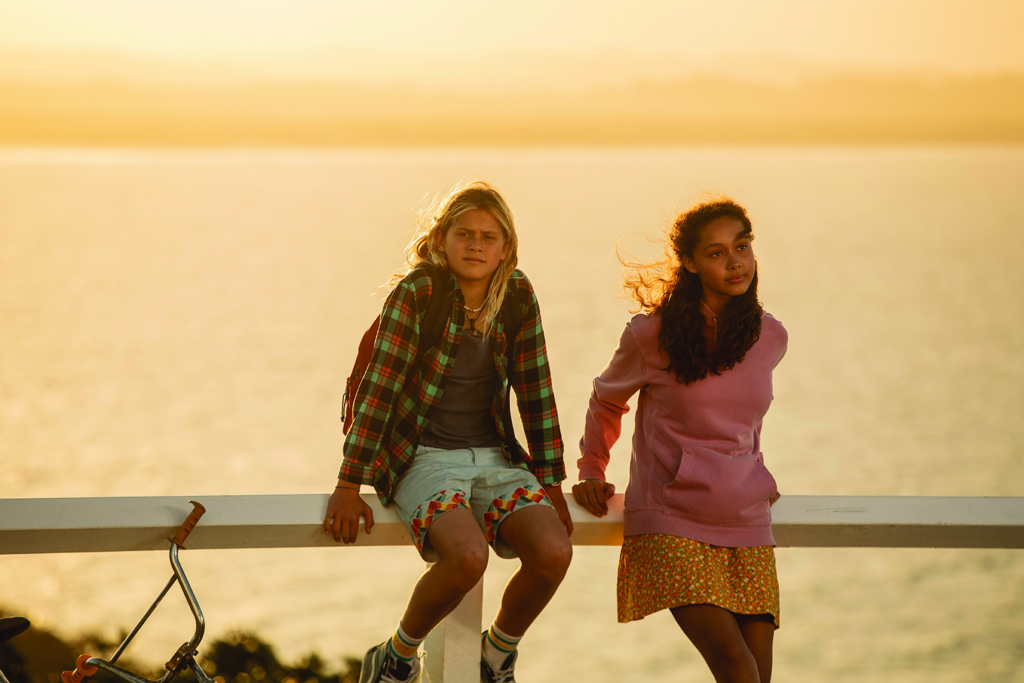
Oliver Pfeiffer: The film says it was inspired by true events. How autobiographical is it?
Tyler Atkins: Bosch & Rockit was inspired by my upbringing. I pulled [from] quite a few different experiences I had as a kid with my father and also within my circle of friends. Back in the eighties and nineties, things were a lot different [with] parenting, so I […] really tried to shape what I experienced as a kid and what I saw my friends experience. Parenting is a really big issue in my life – about unconscious parenting and [its] repercussions […] on a child. [The film] was definitely inspired by me and my dad, and a journey we went on together.
Bosch & Rockit is ultimately about forgiveness, isn’t it?
Yes, it is about forgiveness on both sides. I’ve been sober for about eight years, and so, for me, the themes were really drugs and alcohol in families and how they are widely accepted behind closed doors. Forgiveness is a big one, because I went through kidney disease when I was about twenty and was in and out of hospital for a couple of years, and that was the first time in my life that I really wanted [a relationship with my parents], because I never really had [one], and it was a big thing for me to forgive them. I was holding on to so many issues that happened when we were younger, and I just could never let go of them. I didn’t find out until later in my life, really, what forgiveness was and [understand] that people are who they are, and who was I to expect anything different from my family?
Bosch (Hemsworth) and Rockit (King) both live in their own worlds. Would you say the film is showing how we create our own realities?
It is. I think what bonds Bosch and Rockit is the ocean, and that’s woven in through my film. The ocean is Rockit’s mother; and, for me, without [it], I just couldn’t imagine where I would be. The ocean saved me from drugs and from everything, because every time I was sad I went to the ocean. That is the massive theme in [Rockit’s narrative], and, fortunately enough for him, his dad surfs too, [just like] my dad introduced me to surfing. Surfing is what saved me, and it allowed me to just go and sit in [it] when I was confused or sad. There’s something very healing about that.
And it’s about that bond, as well …
It’s a bond, and there’s a lot of it in [the] surfing scenes. Rasmus […] is a professional surfer, and Luke […] is an incredible surfer too. So I got to use actual actors as the surfers and didn’t have to use stuntpeople; you just capture that essence of them surfing and bonding together.
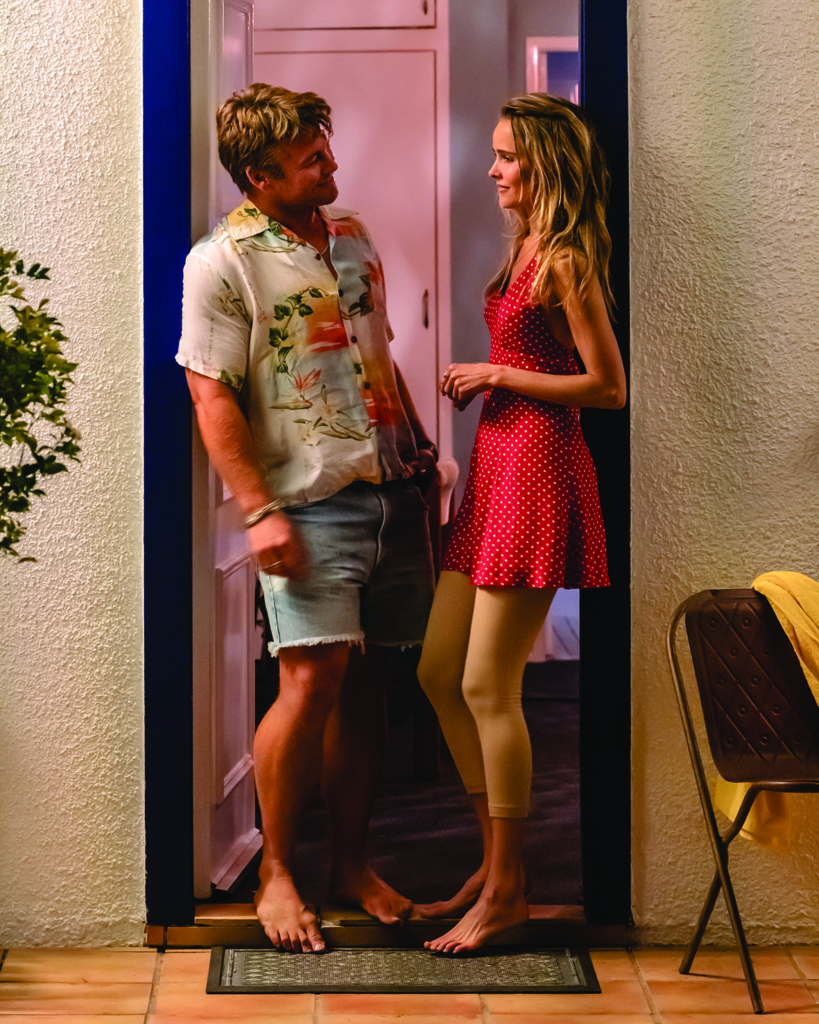
Did you write with Hemsworth in mind?
No, I didn’t really write with anyone in mind. I had spoken to quite a few different actors over the years […] Basically, when Luke came on, he had some really great notes; he came into it really deep into the process – we were about three weeks out from shooting – and he brought a lot and challenged me in all the right ways, and I challenged him in all the right ways. It was a beautiful collaboration, because we didn’t know each other before we met, and we got very close […] It was a pressure cooker. We were one of the first productions to shoot through COVID successfully, and it was hard, [but] we all just bonded together.
How did Hemsworth become involved and interested in your script?
We were a couple of weeks out from shooting, and we didn’t have an actor at [that] stage. My friend Brenton Thwaites put us in touch, and Luke read the script, loved it and jumped on. I was very fortunate. It was really hard during that time to find actors, because no-one was around, and the lockdown was just so intense [that] we couldn’t actually bring anyone in from another state. We live in Byron Bay, and so all the stars lined up.
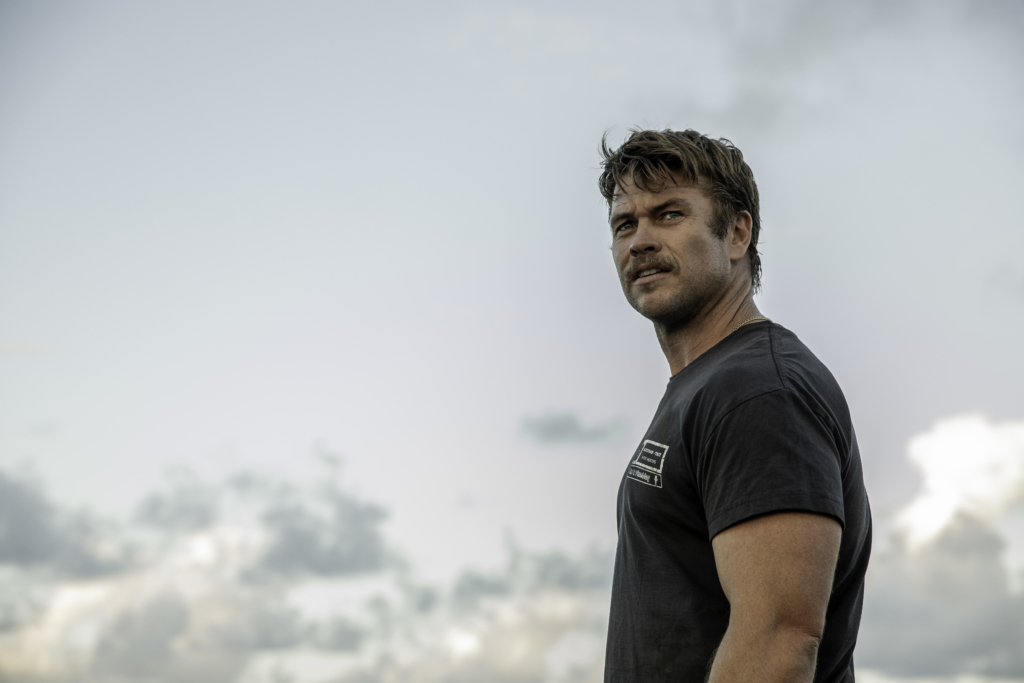
You took a chance with using an unknown actor like King in the lead – the story is told through his eyes. What qualities were you looking for, and how do you feel he fulfilled these?
I’ve known his family for about fourteen years, and I did a shoot with his older brother Kyuss many years ago. I was always thinking about casting Kyuss as Rockit, but he was too old […] I found out that he had a brother and saw him, and he was the kid.
‘I really tried to shape what I experienced as a kid and what I saw my friends experience.’
– Tyler Atkins
When you write a film, you envision certain types of characters […] and the character of Rockit was this very pure and innocent child. When I met Rasmus, it was just undeniable that [he] was the kid, and so I did a little screen test with him and he was incredible. He had never acted before, [but] I had studied acting for about ten years, so I knew how to direct actors and I worked with him […] It was interesting because going through the process of trying to finance my film and getting it made, everyone [I heard] was like, ‘Kids can’t act,’ or […] ‘You can’t really rely on [someone who has never acted before] to lead a film.’ I understood that concern because people in the industry know that to lead a film is incredibly hard [… With] unknown actors who [have] never done acting lessons before, 99.9 per cent of the time you’re not going to get what you want. However, my intuition was very strong about casting Rasmus, and I bonded with him through surfing for about three years; we just became tethered friends and trusted one another. I went against everyone telling me not to cast him because my gut just knew. I’m very intuitive and fought for him, and he delivered. He’s very pure and very innocent.
It’s a very natural performance, isn’t it?
Very natural, and it’s also a raw and authentic piece of Australian cinema. It’s not the most polished film. It’s a very real slice of life into how kids grow up in Australia.
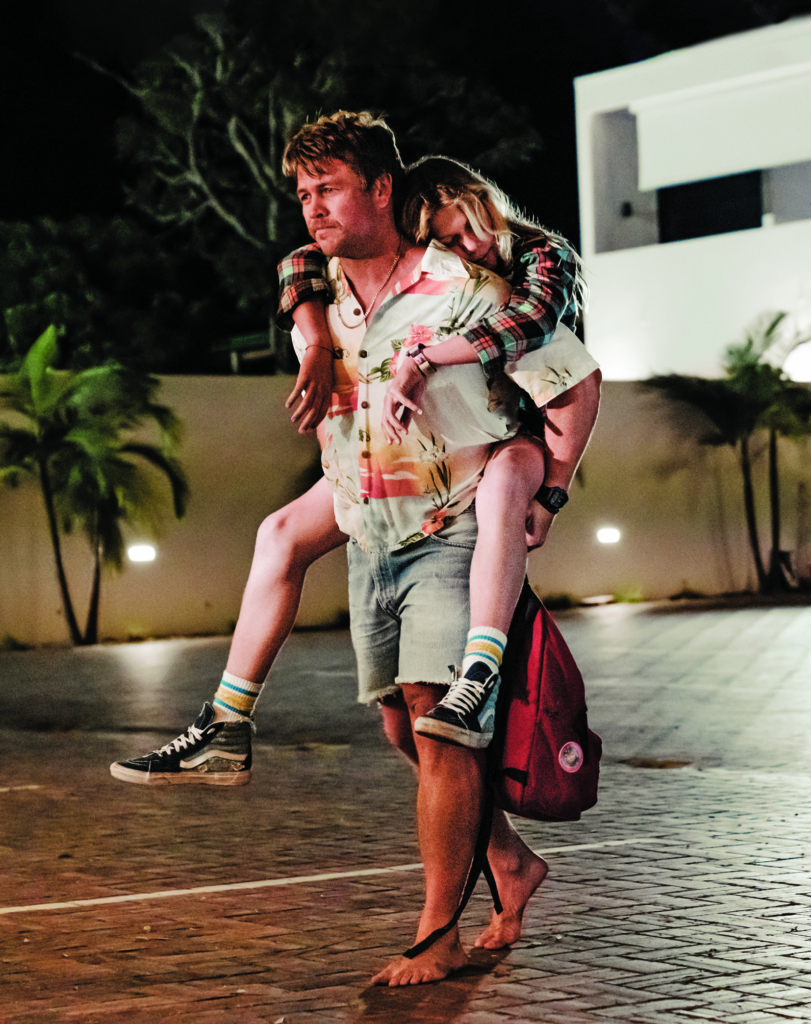
It’s certainly not sugar-coated. You don’t shy away from using profanity in the dialogue, for instance. Was this necessary from an authenticity point of view?
I just wanted to stay true to how I grew up, and how kids still speak in the school grounds today. I hear it all the time, and I didn’t want to sugar-coat that because to me it’s not real […] I fought very hard to keep that [language] in my movie, and the realness of it.
There were a lot of different notes coming through [from collaborators]. I love notes; it really helps you change your perspective. I was [working on this film] for about six years, so [having since become a father] I have the father’s perspective, but I kept the profanity in it just because that is real to Australia and it’s how Aussies talk. To me, that brings an authentic touch to that time and era.
The dynamic between father and son is the film’s driving force. Was there much rehearsal between the actors to enhance the chemistry?
No, we didn’t rehearse too much. It was more scene analysis than rehearsal: they knew what I wanted, and we tried things that didn’t work and tried other things that were amazing. It was a very creative space. Because of my history with acting, we explored together, found this beautiful moment – and I knew exactly the moments I needed in my movie – and every actor in my film delivered […] Luke would come to set even on the days he wasn’t shooting, just to be there with Rasmus. That kind of supportive energy really helps us as a collective because, on a film, there’s anywhere from fifty to 200 people, and so that energy is vital. When you have energy like that, as a family, everyone feels that and it does come through [in] what you capture.
What were your filmic inspirations?
My biggest inspiration for this film was Paper Moon [Peter Bogdanovich, 1973], which has a similar premise, where a guy kind of inherited a young girl and […] had to take her across the country, and he was a scammer. It was just an incredible film, but the cinematic language in that film was beautiful, [and] to me it was just so authentic: a real father and daughter playing the roles.[1]Paper Moon’s protagonists, Moses and Addie, were played by Ryan O’Neal and Tatum O’Neal respectively.
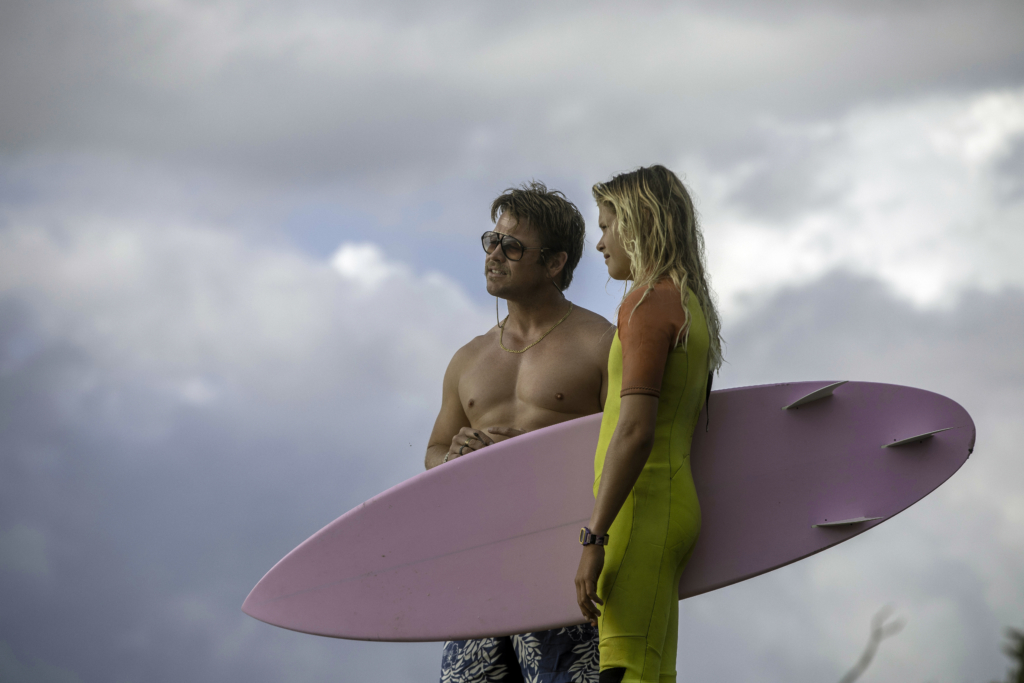
The soundtrack is such an emotive element in Bosch & Rockit, too …
I wrote my screenplay to an artist, who is one of my dear friends […] I was in Los Angeles with him for a long, long time. His name is RY X. I used to go to every one of his shows, and we’re very close friends […] Early on in his career, he had a different sort of sound; then he went and sort of found himself as a human and grew a lot and became very conscious, and his music just changed with him. I wrote my screenplay to his album Dawn, and I was lucky enough to use those same songs throughout my film […] He just invokes this deep, poetic feeling of sound. So when you put that over images, it’s incredible.
‘My biggest inspiration for this film was Paper Moon … The cinematic language in that film was beautiful.’
– Tyler Atkins
Then I worked with [composer] Brian Cachia and found some amazing tracks with him. He came on very late in the process too, so we only had a couple of weeks together trying to get all the cues, and it was very hard, but Brian delivered with RY.
The soundtrack is in the forefront of my film because I love music. It’s interesting, because anyone who sees my movie has gone, ‘That soundtrack is incredible.’ I used Dragon, which is a Kiwi band that my dad used to listen to […] It really just blends these worlds together, because RY’s quite modern – he recorded his [music] around 2015 – but his music has soul in it. [The soundtrack is] timeless, and I tried to make Bosch & Rockit timeless, where you [wouldn’t] know whether it was late nineties or mid 2000s.
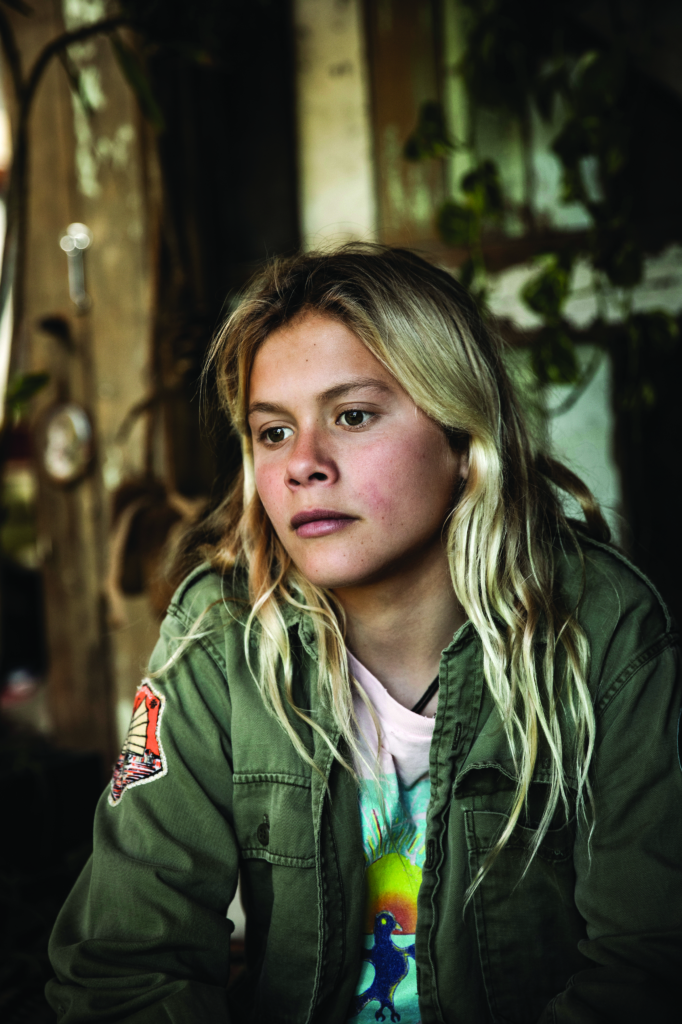
Yes, I noticed there aren’t any smartphones or any of those technological trappings.
I wanted to do that to show that kids used to go out and actually ride their bikes and play. I really wanted to make a film that would show that when Rockit is sad, he would go out and spend time in the ocean. I was born in the eighties, and that was what my generation did. I did not grow up with technology.
It’s just a film you want to watch at the cinemas […] When you’re at a bigger screen, the sound design is incredible and it’s immersive. To me, you have an hour-and-a-half break from the world, and you go into this new world. It is quite a heavy-hitting film, but it is also full of beauty […] when you see those big [wide shots] of Byron Bay. It’s a great escape.
Endnotes
| 1 | Paper Moon’s protagonists, Moses and Addie, were played by Ryan O’Neal and Tatum O’Neal respectively. |
|---|
